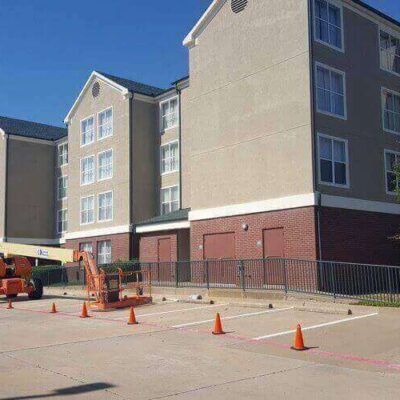Whether you’re renovating your home, clearing out a garden, or managing waste on a construction site, hiring the right waste removal company is crucial. In Basingstoke, local regulations and environmental policies make it even more important to choose a reputable provider—especially when dealing with materials like soil, rubble, or hazardous waste.
In this blog, we’ll guide you through everything you need to know about selecting a reliable, legal, and eco-conscious waste removal company in Basingstoke. We’ll also explain why waste soil legislation in Basingstoke matters—even if you’re just clearing a driveway or disposing of some garden spoil.
Why Choosing the Right Waste Removal Company Matters
Hiring the wrong company for your waste removal might seem like a minor inconvenience, but it can quickly turn into a legal, environmental, or financial nightmare. Common issues include:
-
Illegal dumping (fly-tipping) that leaves you legally responsible
-
Failure to recycle materials that could have been diverted from landfill
-
Non-compliance with waste legislation, including documentation failures
-
Unexpected costs or lack of insurance for damage or delays
Choosing the right provider ensures that waste is removed responsibly, your site is legally compliant, and your environmental footprint is minimized.
Step 1: Understand the Type of Waste You’re Dealing With
Before contacting any company, identify what kind of waste you need removed. Waste removal firms often specialise in specific areas:
-
General household waste: furniture, electronics, old clothes, etc.
-
Green waste: leaves, branches, soil, and organic garden matter
-
Construction and demolition waste: bricks, plasterboard, insulation, concrete
-
Hazardous waste: asbestos, chemicals, contaminated soil
-
Waste soil: particularly relevant for landscaping and construction
Understanding the type of waste helps ensure the company you hire has the expertise and licensing needed—especially important under waste soil legislation in Basingstoke, which governs how different soil types (inert, non-hazardous, hazardous) are tested, classified, and disposed of.
Step 2: Check Licensing and Accreditation
In the UK, all waste carriers must be registered with the Environment Agency. This is not optional. A licensed company should:
-
Provide a valid Waste Carrier License Number
-
Supply a waste transfer note or consignment note for hazardous waste
-
Be transparent about where your waste is going and how it will be handled
You can verify a company’s license by checking the Environment Agency’s public register. For waste soil or construction material, this is particularly critical, as breaches of waste soil legislation in Basingstoke could result in penalties or your project being halted.
Step 3: Evaluate Local Experience and Knowledge
Hiring a local waste removal company in Basingstoke has real benefits. They’ll be more familiar with:
-
Local recycling and disposal facilities
-
Council waste policies and permits
-
Specific requirements under Basingstoke’s environmental strategy
If you’re removing waste soil, a local company should understand how to test and classify it correctly based on waste soil legislation in Basingstoke. For example, if you’re excavating for a driveway or extension, the firm should know whether the soil is inert or if it requires lab testing for contaminants.
Step 4: Ask About Environmental Practices
Environmental sustainability isn’t just a buzzword—it’s a regulatory requirement and ethical obligation. When choosing a waste removal company, ask:
-
What percentage of waste is recycled or reused?
-
Where does the waste go after collection?
-
Do they segregate materials on-site or at a processing facility?
-
Are they registered with any environmental compliance schemes?
Firms that handle waste soil in particular must be up-to-date with the latest classification guidance under the Environment Agency’s WM3 protocol. If they can’t explain the process, they’re not a good fit—especially for commercial or building projects in Basingstoke.
Step 5: Ensure They Provide Documentation
Any professional waste removal company should provide the correct documentation as part of the job. This includes:
-
Waste transfer notes for general or non-hazardous waste
-
Hazardous waste consignment notes if relevant
-
Invoices that itemize services and disposal fees
-
Certificates of disposal or evidence of tipping at licensed sites
This documentation is your legal protection under UK law. If your waste is found dumped illegally or mishandled, you could be held responsible without proof of proper transfer. Under waste soil legislation in Basingstoke, builders and developers are especially vulnerable to fines if they cannot produce soil test results and legal transfer notes.
Step 6: Read Reviews and Get Referrals
Customer reviews and testimonials can tell you a lot about a company’s professionalism, punctuality, and care. Look at:
-
Google Reviews
-
Yell or Trustpilot
-
Local forums or Facebook community groups in Basingstoke
It’s also worth asking for referrals from local tradespeople, garden centres, or even your local council’s waste department—they may have experience working with reliable firms in the area.
Step 7: Get a Transparent Quote
A trustworthy waste removal company should offer clear, upfront pricing. When requesting a quote, ask:
-
Is this a fixed or estimated price?
-
Does it include VAT and disposal fees?
-
Are there charges for certain waste types (e.g., plasterboard, tyres, soil)?
-
Is labour included?
Hidden fees are a common issue, especially if you’ve underestimated your waste volume. A good company will offer a no-obligation site visit to assess the waste before quoting—a smart step for soil-heavy or mixed-waste jobs.
Step 8: Check for Insurance and Safety Protocols
Things can go wrong on a waste removal job—especially on building sites or when heavy materials are involved. Ask to see:
-
Public liability insurance
-
Employer’s liability (if they have a team)
-
Risk assessments or method statements (for larger jobs)
If they’re handling soil or hazardous waste, check their compliance with Control of Substances Hazardous to Health (COSHH) regulations and the waste soil legislation in Basingstoke. This ensures they’re not just legally compliant—but also keeping people and property safe.
Bonus: Signs of a Professional Waste Removal Company
Here’s a quick checklist of red flags and green lights:
| ✅ Professional Company | ❌ Risky or Unlicensed Provider |
|---|---|
| Licensed by the Environment Agency | No license or unclear registration |
| Offers clear documentation | Refuses to provide paperwork |
| Provides a written quote | Only gives verbal pricing |
| Shows proof of insurance | No insurance mentioned |
| Familiar with local laws | Unaware of Basingstoke regulations |
| Positive online reviews | No reviews or poor reputation |
| Transparent waste destinations | Vague about where waste goes |
Why Waste Soil Legislation in Basingstoke Affects Everyone
Even if you’re just removing a few tonnes of garden soil, waste soil legislation in Basingstoke affects the disposal process. If the soil contains building rubble, paint, or previous fuel/oil contamination, it may be classed as non-inert or even hazardous.
This means:
-
You must classify it correctly (under WM3 guidelines)
-
Only licensed carriers can handle it
-
It cannot go to a general landfill
Ignoring these laws could result in fines or site closures—especially for builders and landscapers. That’s why choosing a waste removal company who understands and complies with waste soil legislation in Basingstoke is essential.
Final Thoughts
Choosing the right waste removal company in Basingstoke isn’t just about finding the cheapest quote—it’s about protecting your property, your project, and the environment. From checking licenses to ensuring soil is handled according to local legislation, a little due diligence goes a long way.
When in doubt, remember:
-
Ask questions about their process and compliance
-
Request documentation for all waste movements
-
Prioritise companies with environmental awareness and local experience
Whether you’re clearing out a garden, managing a renovation, or working on a major development site, the right waste partner can make all the difference.




